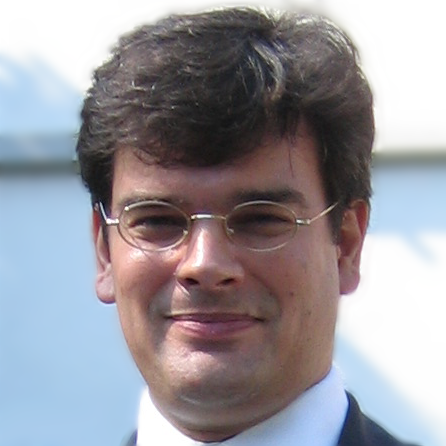Here is the final list of keynote speakers at EuroPython 2014

Pieter Hintjens
Our decentralized future
Pieter will talk about the urgent push towards a decentralized future. As founder of the ZeroMQ community, he will explain the vision, design and reality of distributed software systems. He’ll explain his view on the community itself, also a highly decentralized “Living System”, as Hintjens calls it. Finally he’ll talk about edgenet, a model for a decentralized Internet.
About Pieter Hintjens
Pieter Hintjens is a writer, programmer and thinker who has spent decades building large software systems and on-line communities, which he describes as “Living Systems”. He is an expert in distributed computing, having written many protocols and distributed software systems. He founded the ZeroMQ free software project in 2007, and in 2013 launched the edgenet project to build a fully secure, anonymous peer-to-peer Internet. He is the author of “ZeroMQ - Messaging for Many Applications” (O'Reilly), “Code Connected”, and “Culture and Empire: Digital Revolution”. His blog is at hintjens.com.
Constanze Kurz
One year of Snowden, what’s next?
Since June 2013, disclosed by Edward Snowden, we learn more and more facts about American and British spies’ deep appetite for information, economic spying and the methods they use to collect data. They systematically tapped international communications on a scale that only few people could imagine. But what are the consequences for societies when they now know about the NSA metadata repository capable of taking in billions of “events” daily to collected and analyze? Is there a way to defend against an agency with a monstrous secret budget?
About Constanze Kurz
Constanze Kurz works at the University of Applied Sciences in Berlin as a computer scientist. She is the spokeswoman of the German Chaos Computer Club, Europe’s largest hacker group. She is an expert on surveillance techniques and co-author of technical analyses on voting computers, data retention and anti-terror laws for the German Constitutional Court.

Emily Bache
Will I still be able to get a job in 2024 if I don’t do TDD?
Geoffrey Moores’s book “Crossing the chasm” outlines the difficulties faced by a new, disruptive technology, when adoption moves from innovators and visionaries into the mainstream. Test Driven Development is clearly a disruptive technology, that changes the way you approach software design and testing. It hasn’t yet been embraced by everyone, but is it just a matter of time? Ten years from now, will a non-TDD practicing developer experience the horror of being labelled a technology adoption ‘laggard’, and be left working exclusively on dreadfully boring legacy systems?
It could be a smart move to get down to your nearest Coding Dojo and practice TDD on some Code Katas. On the other hand, the thing with disruptive technologies is that even they can become disrupted when something better comes along. What about Property-Based Testing? Approval Testing? Outside-In Development?
In this talk, I’d like to look at the chasm-crossing potential of TDD and some related technologies. My aim is that both you and I will still be able to get a good job in 2024.
About Emily Bache
Emily Bache is a software developer and test automation specialist. Currently an employee of a Swedish company, Pagero, she works on their electronic invoicing product. Together with her team, she regularly delivers working software. Emily has previously worked as a developer in organizations as diverse as small startup and large corporation, using
Python as well as other languages such as Java, Scala and Ruby. For several years she worked as an independent consultant, facilitating many Coding Dojos and developer training events. Emily is a well-known conference speaker, and author of “The Coding Dojo Handbook”. She is originally from the U.K. but now lives in Göteborg, Sweden.

Travis Oliphant
Python’s Role in Big Data Analytics: Past, Present, and Future
Python has had a long history in Scientific Computing which means it has had the fundamental building blocks necessary for doing Data Analysis for many years. As a result, Python has long played a role in scientific problems with the largest data sets. Lately, it has also grown in traction as a tool for doing rapid Data Analysis. As a result, Python is the center of an emerging trend that is unifying traditional High Performance Computing with “Big Data” applications. In this talk I will discuss the features of Python and its popular libraries that have promoted its use in data analytics. I will also discuss the features that are still missing to enable Python to remain competitive and useful for data scientists and other domain experts. Finally, will describe open source projects that are currently occupying my attention which can assist in keeping Python relevant and even essential in Data Analytics for many years to come.
About Travis Oliphant
Travis has a Ph.D. from the Mayo Clinic and B.S. and M.S. degrees in Mathematics and Electrical Engineering from Brigham Young University. Since 1997, he has worked extensively with Python for numerical and scientific programming, most notably as the primary developer of the NumPy package, and as a founding contributor of the SciPy package. He is also the author of the definitive “Guide to NumPy”.
Travis was an assistant professor of Electrical and Computer Engineering at BYU from 2001-2007, where he taught courses in probability theory, electromagnetics, inverse problems, and signal processing. He also served as Director of the Biomedical Imaging Lab, where he researched satellite remote sensing, MRI, ultrasound, elastography, and scanning impedance imaging.
From 2007-2011, Travis was the President at Enthought, Inc. During his tenure there, the company grew from 15 to 50 employees, and Travis worked with well-known Fortune 50 companies in finance, oil-and-gas, and consumer-products. He was involved in all aspects of the contractual relationship, including consulting, training, code-architecture, and development.
As CEO of Continuum Analytics, Travis engages customers, develops business strategy, and guides technical direction of the company. He actively contributes to software development and engages with the wider open source community in the Python ecosystem.

Bob Ippolito
What can Python learn from Haskell?
What can we learn from Erlang or Haskell for building reliable high concurrency services? Bob was involved in many Python projects but argues that for some domains there may be better methods found elsewhere. He started looking for alternatives back in 2006 when building high concurrency services at Mochi Media (originally with Twisted), which led him to the land of Erlang and later Haskell. Bob is going to talk about what he learned along the way. In particular, he’ll cover some techniques that are used in functional programming languages and how they can be used to solve problems in more performant, robust and/or concise ways than the standard practices in Python. He is also going to discuss some potential ways that the Python language and its library ecosystem could evolve accordingly.
About Bob Ippolito
Bob Ippolito is an entrepreneur and polyglot open source developer from San Francisco, CA. His open source contributions include the json library for Python, the MochiKit framework for Javascript, and the mochiweb web server for Erlang. He’s founder and former CTO of Mochi Media, Inc. and currently dedicates his time to advising startups and working with non-profits such as Mission Bit and The College Initiative as a volunteer educator.











